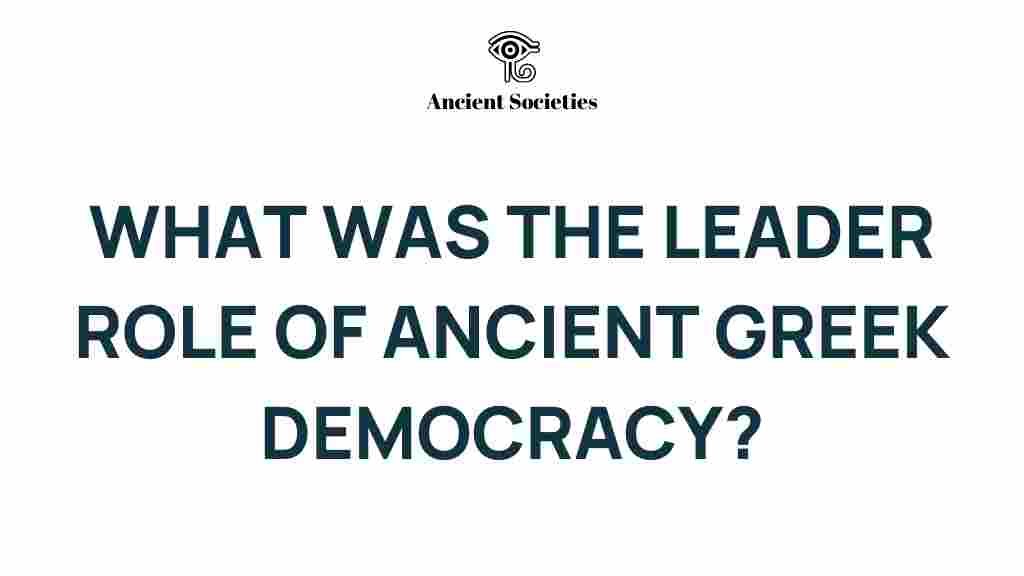Unveiling the Leader’s Role in Ancient Greek Democracy
Ancient Greece is often celebrated as the cradle of democracy, particularly through the lens of Athenian democracy. This political system was revolutionary for its time, emphasizing the importance of citizens’ participation in governance. Leadership within this context was not only a matter of influence but also a civic duty that shaped the course of history. Understanding how leaders operated within this framework can provide valuable insights into the dynamics of democracy itself.
Understanding Ancient Greek Democracy
Democracy in Ancient Greece, especially in Athens, was characterized by direct participation from its citizens. Unlike modern representative democracies, Athenian democracy allowed eligible citizens to engage directly in political decision-making. The leaders in this system were not just rulers; they were facilitators of civic engagement and responsibility.
The Structure of Athenian Governance
The political system in Ancient Greece was complex and multifaceted. Here are some key components:
- Assembly (Ekklesia): The central institution where citizens gathered to discuss and vote on important issues.
- Council of 500 (Boule): A group selected by lot that prepared the agenda for the Assembly.
- Courts (Dikasteria): Citizens participated as jurors in legal cases, showcasing the role of ordinary citizens in governance.
- Magistrates: Elected or appointed officials responsible for various aspects of governance.
Each of these components required leadership from individuals who could guide discussions, inspire civic duty, and make critical decisions on behalf of the community.
The Role of Leaders in Ancient Greek Democracy
In the context of Athenian democracy, leaders emerged not through hereditary privilege but through merit and civic involvement. Their roles were crucial for several reasons:
- Facilitators of Civic Engagement: Leaders encouraged participation among citizens, emphasizing the importance of civic duty.
- Decision-Makers: They were responsible for proposing laws and guiding the community in times of crisis.
- Educators: Leaders often took on the role of educating citizens about their rights and responsibilities, ensuring informed participation.
Leadership in Ancient Greece was thus intertwined with the very fabric of democracy, requiring a deep understanding of governance and the needs of the citizens.
The Impact of Leadership on Athenian Democracy
Effective leadership had a profound impact on the functioning of Athenian democracy. Here are some notable influences:
- Stability: Capable leaders helped maintain order and stability within the city-state, fostering a conducive environment for democratic processes.
- Innovation: Leaders often championed new ideas and reforms that advanced the democratic system, such as the introduction of payment for public office to encourage wider participation.
- Conflict Resolution: Strong leaders played a crucial role in mediating disputes and ensuring that different factions within the city could coexist.
These leaders not only guided their fellow citizens but also left a lasting legacy that shaped the political landscape of Ancient Greece and influenced future democratic systems.
Civic Duty and Responsibilities of Citizens
In Ancient Greece, citizenship came with significant responsibilities. The concept of civic duty was paramount, and leaders were expected to embody these ideals:
- Participation in the Assembly: Citizens were encouraged to attend and voice their opinions on political matters.
- Military Service: Protecting the city-state was viewed as a fundamental duty of citizenship.
- Engagement in Public Discourse: Citizens were expected to engage in discussions about governance and public policy.
Leaders were instrumental in promoting these duties, reinforcing the idea that democracy requires active participation from its citizens.
Challenges Faced by Leaders in Ancient Greece
Despite their pivotal role, leaders in Ancient Greece faced numerous challenges:
- Factionalism: Political factions often emerged, leading to conflicts that could undermine the democratic process.
- Populism: Leaders had to navigate the fine line between representing the will of the people and avoiding demagoguery.
- External Threats: Leaders were responsible for defending the city-state against external threats, which sometimes required difficult decisions.
These challenges tested the mettle of leaders and their commitment to the principles of democracy and civic duty.
Conclusion: The Legacy of Leadership in Ancient Greek Democracy
The role of leaders in Ancient Greek democracy was multifaceted and crucial for the system’s success. Through their guidance, they fostered civic engagement and maintained the delicate balance of governance. Athenian democracy, with its emphasis on citizen participation, remains a significant chapter in the history of political systems.
Today, the principles established in Ancient Greece continue to influence modern democracies, reminding us of the importance of leadership and civic duty. By studying these historical contexts, we can better appreciate the foundations of governance and the ongoing relevance of civic engagement in our own political systems.
For those interested in exploring further, delve into the rich history of Athenian democracy and the lessons it holds for contemporary society. Understanding these dynamics can empower us as engaged citizens in our modern democracies.
In summary, the legacy of leadership in Ancient Greece serves as a powerful reminder of the vital role that individuals play in fostering a robust and participatory political system. This history not only enriches our understanding of democracy but also emphasizes the continuous need for active citizen involvement and responsible leadership.
This article is in the category History and created by AncientSocieties Team
